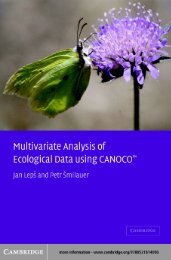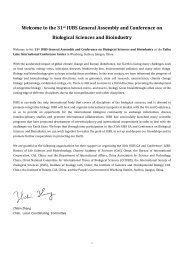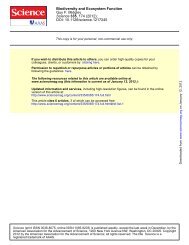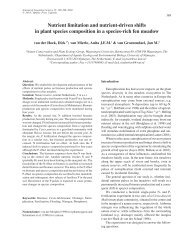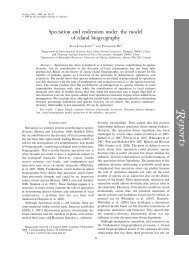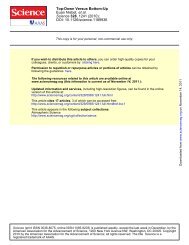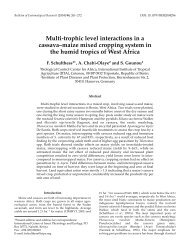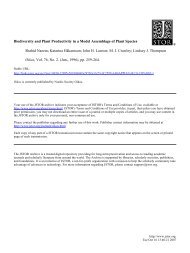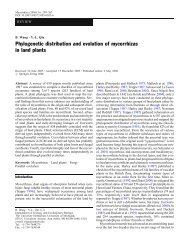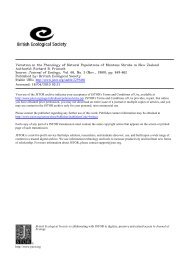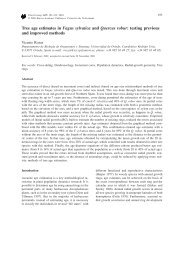Ecological and Evolutionary Responses to Recent Climate Change
Ecological and Evolutionary Responses to Recent Climate Change
Ecological and Evolutionary Responses to Recent Climate Change
You also want an ePaper? Increase the reach of your titles
YUMPU automatically turns print PDFs into web optimized ePapers that Google loves.
Annu. Rev. Ecol. Evol. Syst. 2006.37:637-669. Downloaded from arjournals.annualreviews.org<br />
by Sun Yat-Sen University Library on 01/09/07. For personal use only.<br />
Few studies have been conducted at a scale that encompasses an entire species’<br />
range (i.e., a continental scale), with only a moderate number at the regional scale<br />
(e.g., the United Kingdom or Germany). Most have been conducted at local scales,<br />
typically at a research station or preserve. Continental-scale studies usually cover<br />
most or all of a species’ range in terrestrial systems (Both et al. 2004, Bur<strong>to</strong>n 1998a,b,<br />
Dunn & Winkler 1999, Menzel & Fabian 1999, Parmesan 1996, Parmesan et al.<br />
1999). However, even a continental scale cannot encompass the entire ranges of<br />
many oceanic species (Ainley & Divoky 1998, Ainley et al. 2003, Beaugr<strong>and</strong> et al.<br />
2002, Croxall et al. 2002, Hoegh-Gulberg 1999, McGowan et al. 1998, Reid et al.<br />
1998, Spear & Ainley 1999). Terrestrial endemics, in contrast, can have such small<br />
ranges that regional, or even local, studies may represent impacts on entire species<br />
(Pounds et al. 1999, 2006).<br />
Meta-Analyses <strong>and</strong> Syntheses: Globally Coherent<br />
Signals of <strong>Climate</strong>-<strong>Change</strong> Impacts<br />
A h<strong>and</strong>ful of studies have conducted statistical meta-analyses of species’ responses or<br />
have synthesized independent studies <strong>to</strong> reveal emergent patterns. The clear conclusion<br />
across global syntheses is that twentieth-century anthropogenic global warming<br />
has already affected the Earth’s biota (IPCC 2001a; Parmesan 2005a,b; Parmesan<br />
& Galbraith 2004; Parmesan & Yohe 2003; Peñuelas & Filella 2001; Pounds et al.<br />
2005; Root & Hughes 2005; Root et al. 2003; Thomas 2005; Walther et al. 2002,<br />
2005).<br />
One study estimated that more than half (59%) of 1598 species exhibited measurable<br />
changes in their phenologies <strong>and</strong>/or distributions over the past 20 <strong>to</strong> 140 years<br />
(Parmesan & Yohe 2003). Analyses restricted <strong>to</strong> species that exhibited change documented<br />
that these changes were not r<strong>and</strong>om: They were systematically <strong>and</strong> predominantly<br />
in the direction expected from regional changes in the climate (Parmesan &<br />
Yohe 2003, Root et al. 2003). Responding species are spread across diverse ecosystems<br />
(from temperate grassl<strong>and</strong>s <strong>to</strong> marine intertidal zones <strong>and</strong> tropical cloud forests)<br />
<strong>and</strong> come from a wide variety of taxonomic <strong>and</strong> functional groups, including birds,<br />
butterflies, alpine flowers, <strong>and</strong> coral reefs.<br />
A meta-analysis of range boundary changes in the Northern Hemisphere<br />
estimated that northern <strong>and</strong> upper elevational boundaries had moved, on average,<br />
6.1 km per decade northward or 6.1 m per decade upward (P < 0.02) (Parmesan<br />
& Yohe 2003). Quantitative analyses of phenological responses gave estimates of<br />
advancement of 2.3 days per decade across all species (Parmesan & Yohe 2003) <strong>and</strong><br />
5.1 days per decade for the subset of species showing substantive change (>1 day per<br />
decade) (Root et al. 2003).<br />
A surprising result is the high proportion of species responding <strong>to</strong> recent, relatively<br />
mild climate change (global average warming of 0.6 ◦ C). The proportion of wild<br />
species impacted by climate change was estimated at 41% of all species (655 of 1598)<br />
(Parmesan & Yohe 2003). This estimate was derived by focusing on multispecies<br />
studies that reported stable as well as responding species. Because responders <strong>and</strong><br />
Meta-analysis: set of<br />
statistical techniques<br />
designed <strong>to</strong> synthesize<br />
quantitative results from<br />
similar <strong>and</strong> independent<br />
experiments<br />
www.annualreviews.org • <strong>Climate</strong>-<strong>Change</strong> Impacts 641



